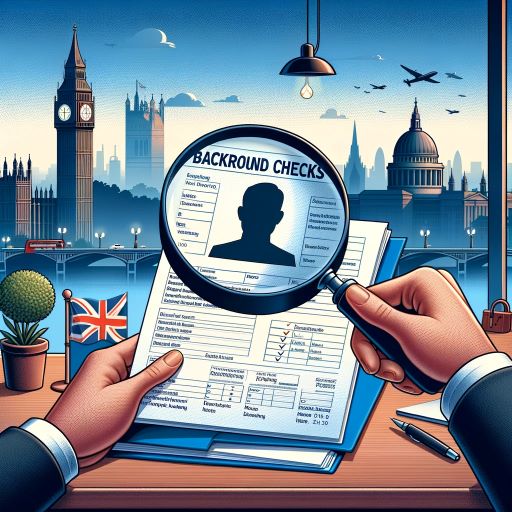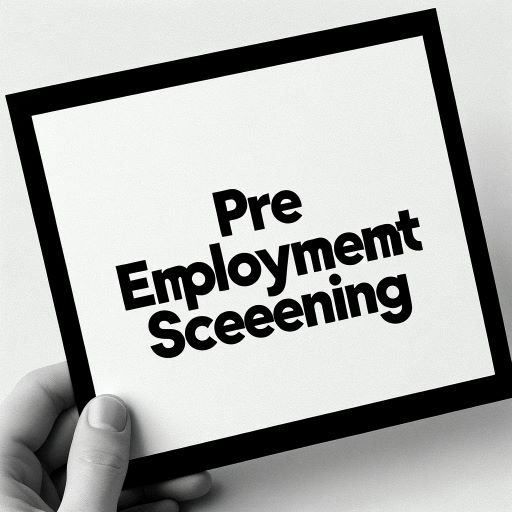

It's important to take into account legal implications when making such decisions, as they must be rooted in legitimate concerns. Communicate the reasons for the offer withdrawal to the candidate transparently and promptly after reviewing the screening results.
Approach the situation with sensitivity, recognizing the potential impact on the individual, and abide by all relevant laws and regulations throughout the process. By handling the withdrawal of job offers professionally and ethically, you safeguard both the candidate's rights and the integrity of your organization's hiring practices.
To enhance your hiring process, make sure you conduct key checks such as qualifications, identity, credit, social media, right to work, and criminal record checks during preemployment screening. These checks are vital to guaranteeing you hire the right candidates and maintain a safe and compliant workplace environment.
Here are three essential checks to include in your screening process:
1. Qualifications: Verify the educational and professional credentials provided by the candidate to confirm they possess the necessary skills and expertise for the job.
2. Identity: Confirm the identity of the candidate to prevent identity fraud and establish they're who they claim to be.
In the UK, the duration of pre-employment screening checks can vary significantly depending on the type and depth of the checks being conducted, as well as the industry and specific job role requirements. Generally, basic checks, such as identity verification and employment history, can be completed within a few days to a week. More comprehensive checks, including criminal record checks (DBS checks), credit history, and higher-level security clearances, may take longer.
An employee background check can encompass a wide range of verifications and screenings to assess a candidate's history and suitability for a position. The specific elements included in a background check may vary depending on the job, the industry, and the employer's requirements. Common components of an employee background check include:
Identity Verification: Confirms the candidate's identity through government-issued documents like passports or driver's licenses.
Employment History Verification: Checks the candidate's previous employment, including positions held, dates of employment, reasons for leaving, and rehire eligibility.
Education Verification: Confirms the candidate's educational degrees, diplomas, and certificates from colleges, universities, and other educational institutions.
Criminal Record Check: Searches for any criminal convictions, cautions, reprimands, or warnings. In some countries, this is known as a Disclosure and Barring Service (DBS) check in the UK or a criminal background check in the US.
Credit History Check: Reviews the candidate's credit history, which can be relevant for positions involving financial responsibilities. This check typically includes looking at credit scores, outstanding debts, bankruptcies, and financial mismanagement.
Reference Checks: Involves contacting previous employers, colleagues, or academic references to gain insights into the candidate's work ethic, abilities, and behavior.
3. Criminal Record: Conduct criminal record checks, including Disclosure and Barring Service (DBS) checks where applicable, to assess any potential risks associated with the candidate and safeguard the safety of your workplace.
Background check companies play a vital role in enhancing preemployment screening processes for organizations. Companies like Eurocom CI offer specialized solutions tailored to meet your screening needs. With dedicated teams proficient in various background checks, these companies guarantee thorough screenings aligned with industry standards such as BPSS, SMCR, and PCI Compliance.
Eurocom CI provides flexible options, offering both individual checks and regular screening programs to streamline your hiring process. By leveraging the expertise of background check companies, you can ensure compliance with data protection regulations while conducting thorough preemployment checks efficiently. These companies assist in verifying the honesty and experience of potential employees, helping you make informed hiring decisions and mitigate risks effectively.

Trusting a reputable background screening provider can greatly strengthen your hiring process and safeguard your organization's interests.
Enhancing candidate evaluations through thorough social media vetting and detailed references is key in making wellinformed hiring decisions. When it comes to social media vetting and references:
1. Social Media Vetting: With 92% of companies using social media in recruitment, it's essential to assess candidates' online presence. Social media can provide valuable insights into a candidate's personality, professionalism, and potential red flags.
2. Impact on Hiring Decisions: A candidate's social media presence can influence hiring choices, particularly for clientfacing roles. It's important to verify that a candidate's online behavior aligns with the company's values and image.
3. Importance of Detailed References: References play an important role in verifying information on resumes and evaluating cultural fit. Detailed references offer deeper insights into a candidate's background, skills, and work ethic, aiding in making wellrounded hiring decisions.
What Does PreEmployment Screening Involve? When hiring, you need to conduct thorough preemployment screening. This process guarantees you make informed decisions by verifying qualifications, checking criminal records, and contacting references.

It may also involve social media checks to assess online presence. By tailoring screenings to your needs and using advanced services like directorship and compliance checks, you can strengthen the hiring process and make confident decisions in compliance with regulations.
What Is a Pre Screening Test for a Job? When considering a prescreening test for a job, it serves as an evaluation process to assess your qualifications, skills, and suitability for a specific role. These assessments may include interviews, background checks, drug tests, and personality evaluations.
The purpose is to verify you meet job requirements and align well with the organization. Employers utilize these tests to minimize hiring risks, enhance recruitment quality, and make informed decisions based on your capabilities and potential performance.
How Long Does PreEmployment Checks Take? Preemployment checks can vary in duration, taking anywhere from a few days to several weeks. The time frame hinges on factors like screening complexity and candidate responsiveness.
Basic checks like identity verification are swift, but extensive ones like criminal record checks may prolong the process. To manage expectations, employers should communicate the expected timeline to candidates.Prompt responses and organized documentation from candidates can speed up the screening process.
What Background Checks Do Employers Do? Employers typically conduct various background checks on potential hires. These checks include qualifications verification, identity verification, criminal record checks, reference checks, and social media checks.
